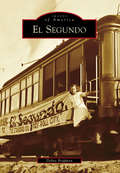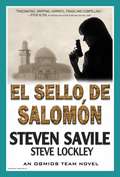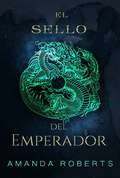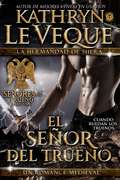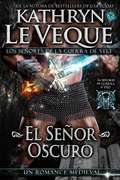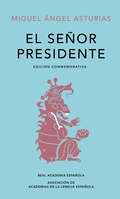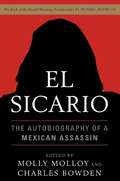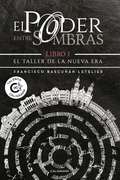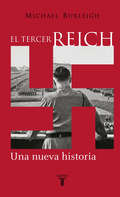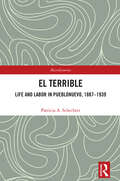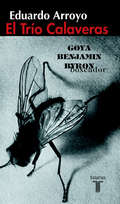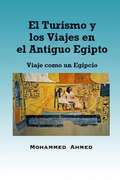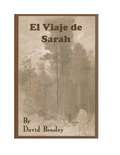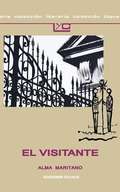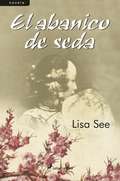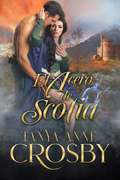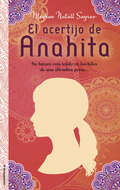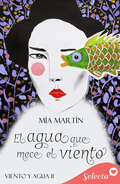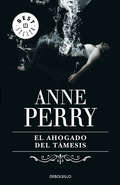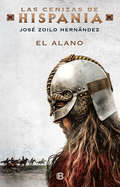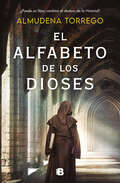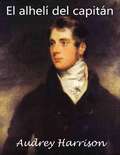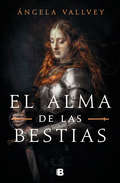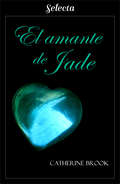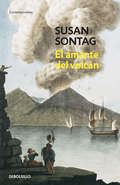- Table View
- List View
El Segundo (Images of America)
by Debra BrightonBy 1885, Daniel Freeman owned a successful 25,000-acre ranch along the coastline in Southern California. That year, he sold parcels to J.S. Vosberg, and this became the site of the town of El Segundo. The Standard Oil Company of California purchased 840 acres of dunes in June 1911, and R.J. Hanna was hired to construct and manage the new refinery. His wife is credited with naming the town El Segundo ("the second"), as it was the location of the second Standard Oil plant. The city quickly expanded and was incorporated on January 18, 1917. From an early oil town to the "Aerospace Capital of the World" in the mid-1950s, El Segundo today includes a thriving residential community as well as several Fortune 500 corporations, an Air Force base, and the Chevron El Segundo Refinery.
El Sello De Salomón
by Steven Savile Rodolfo Laiz Ledesma¡EL ESPERADÍSIMO REGRESO DEL EQUIPO OGMIOS!"Es perfecto para aquellos fans del Código DaVinci que busquen otra lectura apasionante que combina la historia bíblica con un Armagedón actual." Douglas Presston, autor de betsellers del NYT como IMPACTO y Blasfemia.Tras el descubrimiento del tanto tiempo buscado SELLO DE SALOMÓN Konstantin Khavan y Orla Nyren se ven embueltos en una lucha mortal en Jerusalén y Palestina, con enemigos en todos los bandos. No saben en quien pueden confiar. No saben cuál será su siguiente camino. Lo único que saben es que tienen que encontrar el Sello mientras evitan la explosión de una bomba sucia en uno de los lugares más sagrados de Jerusalén.Lo que no esta mal, pero Orla ya ha estado aquí antes, durante los peores dias de su vida cuando era una prisionera en Jenin, un campamento de refugiados junto a la frontera. Fue brutalmente violentada por un sádico al que recuerda como la Bestia, un hombre al que creía haber matado durante su fuga.Pero no está muerto.Es el hombre que tiene el Sello.Y Orla tendrá que enfrentarse a la Bestia sola.
El Sello del Emperador
by Amanda RobertsEl Sello del Emperador -el símbolo divino del emperador en la tierra- está perdido. La emperatriz hará lo que sea para recuperarlo. Jiayi tiene un don- puede viajar a través del tiempo con solo tocar un objeto histórico. Lo que más desea es escapar de las garras de la emperatriz y huir a otras tierras. Encontrar el sello del emperador podría ser su única oportunidad para encontrar la libertad, pero ¿está dispuesta a enfrentar la ira de la emperatriz? Zhihao, un historiador y arqueólogo amateur, no simpatiza ni un poco con la emperatriz ni con la dinastía Qing, pero cuando la emperatriz le ordena que encuentre el sello a cambio de que ella ayude a fundar el primer museo de historia de China, él simplemente no puede negarse. Lo último que esperaba Zhihao es que la clave para encontrar el sello es una esclava del palacio. Poniendo en riesgo sus vidas, Jiayi y Zhihao buscan el sello mientras su misión se ve amenazada por abusivas fuerzas extranjeras y revueltas sociales.
El Señor Del Trueno
by Kathryn Le Veque1258 D.C. - Mientras Henry III pasa la mayor parte de su tiempo en Francia y enfocado en sus favoritos Franceses, poderosos barones Ingleses incluyendo a Simon de Montfort empiezan a formar una alianza en su contra. Subiendo al poder en este tiempo oscuro e incierto es la Casa de de Shera; dirigida por Gallus de Shera, Conde de Coventry y señor Marshal de Worcestershire, Gallus esta flanqueado por sus hermanos Maximus y Tiberius, formando un circulo inquebrantable de fuerza que no puede ser roto. Todos conocen y temen a los poderosos hermanos de Shera. Cuando Gallus de Shera es presionado a entrar a un contrato marital con la hija mayor de Hugh Bigod, otro poderoso caudillo, él se niega ante la sugerencia pero se resigna al hecho de que tiene muy pocas opciones, como la poderosa familia Bigod harían fuertes relaciones familiares. Pero antes de que el contrato pueda tomar lugar, un momento fortuito a tiempo que lo ve a él salvando a una hija Galesa con sangre real. La Señora Jeniver Tacey ferch Gaerwen es hija de reyes y Gallus se enamora al instante con la joven de cabello negro. Cuando el padre de Jeniver herido mortalmente, le ruega a Gallus que se case con su hija. Sin poder rehusar el pedido de un hombre en su lecho de muerte, Gallus acepta. Aunque él sabe que debe enfrentar a Hugh Bigod en algún momento en el hecho de que el ya no es un soltero elegible, él no tiene remordimientos – todo lo que él se puede enfocar ese n su nueva esposa, y una ponderosa historia de amor a nacido. Reúnete con Gallus y Jeniver mientras ellos se embarcan en una nueva vida juntos, donde los barones Ingleses verán su matrimonio destrozado aun cuando se rebelan contra Henry III. Es un viaje épico de políticas, traición, odio, y últimamente una pasión eterna entre Gallus y Jeniver en este excitante primer libro de una trilogía de tres.
El Señor Oscuro
by Kathryn Le Veque Laura RomoEl año es 1180 d.C. y se viven tiempos oscuros. La mayor parte de Inglaterra se encuentra en la anarquía y la gente vive con miedo. Durante este periodo de tiempo, el perverso y brutal caballero Jax de Velt comenzaba a elevarse al poder. Su misión es conquistar un gran tramo de las fronteras escocesa y gala, y ganar el control de la fortuna y las propiedades de las mismas. Él desea ser el guerrero más temido y poderoso en Inglaterra, Gales y Escocia, y está en camino de lograrlo. El último en una larga línea de oscuros y poderosos guerreros, Ajax es el caballero más despiadado y ambicioso en las Islas; aún los más vigorosos caballeros le temen al hombre por sus tácticas a sangre fría. Además de eso, su sed de sangre, así como su habilidad con la espada, son legendarias. Pero mientras Ajax y su ejército conquistan el último castillo en su plan para asegurar las fronteras, se encuentra inesperadamente con su par en una irascible mujer llamada Kellington Coleby. Hermosa, inteligente y testaruda, Kellington se rehúsa a rendirse ante un hombre que es tan apuesto como brutal. El guerrero y la doncella se enfrentan cara a cara en esta inolvidable historia de amor, guerra, devoción, miedo y aventura.
El Señor Presidente (Edición conmemorativa de la RAE y la ASALE #Volumen)
by Miguel Ángel AsturiasEdición conmemorativa de la obra maestra de Miguel Ángel Asturias, Premio Nobel de Literatura. Escrita entre 1920 y 1933 y publicada en 1946, El señor presidente es uno de los máximos exponentes de la llamada «novela del dictador» en la que se encuadran otras obras fundamentales como Yo el Supremo, de Roa Bastos, Tirano Banderas, de Valle-Inclán, El otoño del patriarca, de Gabriel García Márquez, o más recientemente, La Fiesta del Chivo, de Mario Vargas Llosa. En ella, Asturias se inspira en el último gobierno de Manuel Estrada Cabrera, en Guatemala, para explorar los mecanismos que hacen funcionar una dictadura política, así como sus efectos en la sociedad. Narrada desde distintos puntos de vista que van conformando de manera indirecta la figura del Presidente, esta novela es uno de los antecedentes más notables del boom latinoamericano y del realismo mágico, cuyo máximo exponente es GarcíaMárquez. Su declarada condena de las injusticias y la tiranía le valió ser censurada y prohibida durante trece años, mientras que, en contraposición, su riqueza estilística y la originalidad de su estructura narrativa la convirtieron en una de las novelas que más influyeron en toda una generación de autores de América Latina. Adaptada al cine y al teatro, y traducida a los principales idiomas, la novela tuvo una gran acogida en el momento de su publicación tanto por la crítica como por los lectores. Reseña:«El vigor apasionado con el que Asturias evoca el terror y la desconfianza que envenenó el ambiente social de la época hace de su trabajo un reto y un gesto estético de valor incalculable.»Comité del Premio Nobel
El Sicario: The Autobiography of a Mexican Assassin
by Charles Bowden Molly MolloyIn this unprecedented and chilling monologue, a repentant Mexican hitman tells the unvarnished truth about the war on drugs on the American. El Sicario is the hidden face of America's war on drugs. He is a contract killer who functioned as a commandante in the Chihuahuan State police, who was trained in the US by the FBI, and who for twenty years kidnapped, tortured and murdered people for the drug industry at the behest of Mexican drug cartels. He is a hit man who came off the killing fields alive. He left the business and turned to Christ. And then he decided to tell the story of his life and work. Charles Bowden first encountered El Sicario while reporting for the book "Murder City". As trust between the two men developed, Bowden bore witness to the Sicario's unfolding confession, and decided to tell his story. The well-spoken man that emerges from the pages of El Sicario is one who has been groomed by poverty and driven by a refusal to be one more statistic in the failure of Mexico. He is not boastful, he claims no major standing in organized crime. But he can explain in detail not only torture and murder, but how power is distributed and used in the arrangement between the public Mexican state and law enforcement on the ground - where terror and slaughter are simply tools in implementing policy for both the police and the cartels. And he is not an outlaw or a rebel. He is the state. When he headed the state police anti-kidnapping squad in Juarez, he was also running a kidnapping ring in Juarez. When he was killing people for money in Juarez, he was sharpening his marksmanship at the Federal Police range. Now he lives in the United States as a fugitive. One cartel has a quarter million dollar contract on his head. Another cartel is trying to recruit him. He speaks as a free man and of his own free will - there are no charges against him. He is a lonely voice - no one with his background has ever come forward and talked. He is the future - there are thousands of men like him in Mexico and there will be more in other places. He is the truth no one wants to hear.
El Taller de la Nueva Era (El poder entre sombras #Volumen 1)
by Francisco Bascuñán LetelierAlguien tiene el poder y te mira. <P><P> «El poder entre sombras» es una saga conformada por una serie de novelas en contexto histórico, entretenidos thrillers de acción con situaciones conflictivas y peligrosas; donde el lector se involucra y apasiona. El Taller de la Nueva Era, primer libro de la saga, está ambientado en Santiago de Chile entre los años 1968 y 1973. Un emblemático profesor selecciona a un grupo de estudiantes y forma un taller para estudiar el enigma de la «Logia Lautarina». <P><P>Su formación e injerencia en la independencia de las colonias españolas y posteriormente en su precario y sinuoso desarrollo socioeconómico. Para ello, se enfrentan a una peligrosa y conflictiva misión, a tal punto que lo que se inicia como una simple tarea para un taller de clases, termina en peligro extremo ¡de vida o muerte! ¿Los próceres son verdaderamente lo que la historia nos dice que son? ¿Qué es la Logia Lautarina?¿Sigue la logia actuando hasta nuestros días? ¿Quiénes se oponen a que se realicen estos estudios? <P>Entre las peripecias que sortean, profesor y alumnos, para protegerse de una conspiración malvada que trata de evitar la revisión de una casa antigua con túneles siniestros y hallazgos insospechados, la narración lleva al lector a conocer pintorescos rincones del Santiago de esa época y a un terrible e inesperado desenlace a nivel internacional. En un conflictivo trasfondo histórico, se aprecia la degradación de la sociedad, de la economía y de la políticade ese tiempo.
El Tercer Reich: Una nueva historia
by Michael BurleighMichael Burleigh nos ofrece una visión radicalmente nueva del Tercer Reich desde su gestación hasta su destrucción final. Antes de la aparición de esta obra, ganadora del prestigioso Premio de Ensayo Samuel Johnson 2001, no existía una historia completa sobre la Alemania nazi, a pesar de que ha sido uno de los fenómenos más estudiados del siglo XX. Este libro demuestra que el abandono de la democracia y la tolerancia que protagonizó el Tercer Reich estaba extendido por la Europa de la época. Narra cómo un movimiento pseudorreligioso, imbuido de un sentimentalismo demagógico, parecía ofrecer la salvación a una Alemania exhausta por la guerra y la creciente inflación. Muestra las consecuencias de la desaparición del gobierno de la ley en favor del terror. Pero, a diferencia de otros recientes estudios de este periodo, no condena a toda la nación alemana. Explica la compleja moralidad utilizada para «legitimar» el Holocausto porparte de quienes lo llevaron a cabo y recrea con brillantez las complejidades de la vida bajo un régimen totalitario, que gobernó casi toda Europa durante cuatro años. Reseñas:«Estas pasmosa investigación le dejará sin aliento. Más profunda que cualquier otra, es el producto de un verdadero genio.»The Sunday Times «Esta brillante visión de una gran tiranía es una importantísima contribución para entender el siglo XX.»Booklist
El Terrible: Life and Labor in Pueblonuevo, 1887-1939 (ISSN)
by Patricia A. SchechterThis book is a biography of Pueblonuevo del Terrible, a mining town located in Andalusia, Spain. Based on previously unexamined sources, the study paints a fresh portrait of industrial workers and their families in Córdoba province, enriching our understanding of this mostly agricultural region.Previous studies of laboring communities in Spain have identified radical workers, miners among them, as a destabilizing element due to their insurgent protest activity, including lethal violence. This study, by contrast, describes both worker activism and cross-class organizing as constructive, not destructive, and aimed at integration into Spanish society. Economically, the mining zone was dominated by a French company in the Rothschild portfolio. But by running their own city, waging peaceful labor strikes, raising a church, building housing, and honoring their dead, residents turned a quasi-colonial outpost into a pueblo worth defending, and they rallied in defense of the Republic at the outbreak of the Spanish Civil War. In the making of Pueblonuevo del Terrible, Spanish men and women contended with the perils of mine work, the jolts of industrial capitalism, creeping fascism, and civil war.As such, this book tells a village-scale story of global events that defined the twentieth century.
El Trío Calaveras: Goya, Benjamín, Byron
by Eduardo ArroyoEduardo Arroyo deja por esta vez los pinceles y decide tomar la pluma para captar estos tres cuadros, este triángulo negro formado por tres geniales artistas, cuya obra perdura y perdurará en siglos futuros. Eduardo Arroyo traza en esta obra los retratos de tres personajes unidos por la melancolía y la angustia: Goya, Walter Benjamin y lord Byron. Las voces del pintor, el filósofo y el poeta se unen en lamentos de persecución, exilio y muerte. Goya murió en el exilio en Burdeos, Walter Benjamin se quitó la vida ante la pesadilla nazi y lord Byron encontró la muerte en tierras griegas, luchando por la libertad de ese país. Los tres, que se adentraron por el camino de la autodestrucción, se presentan ante el autor como calaveras descarnadas, abandonadas a su suerte en cementerios poco gloriosos. Eduardo Arroyo deja por esta vez los pinceles y decide tomar la pluma para captar estos tres cuadros, este triángulo negro formado por tres geniales artistas, cuya obra perdura y perdurará en siglos futuros.
El Turismo y los Viajes en el Antiguo Egipto: Viaje como un Egipcio
by Mohammed Yehia Z. Ahmed"Da pan al hambriento, agua al sediento, ropa al desnudo y un barco a los que no tienen [...]". Es un antiguo texto egipcio que muestra cuánto viajar era una actividad humana importante en los tiempos antiguos. Los especialistas ahora han clasificado la movilidad en las categorías de los viajes y el turismo. Además, existen varios tipos y propósitos de turismo y viajes y esto no era lo mismo entre las primeras naciones, por lo tanto ellos están cambiando en el transcurso del tiempo. El viaje en el antiguo Egipto plantea muchas cuestiones a las cuales todavía no tenemos respuestas precisas, por lo tanto este libro pretende investigar estos temas. Para responder a estas preguntas, los enfoques analíticos y descriptivos fueron elegidos lo que permito llevar a cabo este trabajo. Esto incluye análisis de las pinturas murales de las tumbas y los templos que se consideran como la fuente pictórica así como de las fuentes escritas extraídas de la literatura y los escritos egipcios. El libro concluye que el viaje era conocido en el antiguo Egipto desde los tiempos predinásticos. Si aplicamos la terminología y los conceptos actuales de la industria del turismo, de hecho los antiguos egipcios conocían varias formas de turismo y viajes como los viajes internos e internacionales, los viajes de ocio, negocios y aventuras. Este nuevo libro presenta el resultado de investigaciones sobre uno de los temas misteriosos relacionados con los antiguos egipcios y que fue objeto de descubrimientos e investigaciones insatisfactorias, trata del tema de "los viajes en el antiguo Egipto". Responde a los intereses no sólo de los egiptólogos y los especialistas en historia y turismo, sino también de todos los seres humanos y más generalmente de los lectores que tienen una inclinación a comparar y distinguir las diferencias y similitudes entre los viajes en los tiempos antiguos y los de ahora. Este libro ofrece descripciones muy detalladas de los via
El Viaje de Sarah
by David Richard BeasleyEl Viaje de Sarah está ambientada en los Estados Unidos y Canadá del siglo XIX. Sarah, una niña medio negra, nació en la esclavitud en Virginia pero huye en 1820 a la libertad en Canadá, donde no hay esclavitud. La historia comienza cuando Sarah tiene 16 años y sigue su vida hasta su muerte en la parte superior de Canadá. A medida que la historia se desarrolla, Sarah se encuentra con la cara violenta del racismo que marca su vida como esclava y más tarde como una mujer libre. Ella tiene muchos hijos, muchos de los cuales son blancos. ¿Qué les va a pasar? ¿Serán considerados esclavos para siempre? Sarah es una heroína de valentía y espíritu admirable cuya saga es inspiradora y positiva. Ella supera las dificultades en su vida con optimismo y ayuda a otras personas a sobrellevar sus vidas.
El Visitante
by Alma MaritanoContinuación de Baqueros y trenzas, es una novela juvenil que narra la historia de un grupo de adolescentes en la ciudad de Rosario, Argentina.
El abanico de seda
by Lisa SeeEsta novela es una ventana a un mundo asombroso, lejano y desconocido, un retrato vivo de la vida de unas mujeres extraordinarias que dejará en el lector una impresión difícil de olvidar. En una remota provincia de China, las mujeres crearon hace siglos un lenguaje secreto para comunicarse libremente entre sí: el nu shu. Aisladas en sus casas y sometidas a la férrea autoridad masculina, el nu shu era su única vía de escape. Mediante sus mensajes, escritos o bordados en telas, abanicos y otros objetos, daban testimonio de un mundo tan sofisticado como implacable. El año 2002, la autora de esta novela viajó a la provincia de Huan, cuna de esta milenaria escritura fonética, para estudiarla en profundidad. Su prolongada estancia le permitió recoger testimonios de mujeres que la conocían, así como de la última hablante de nu shu, la nonagenaria Yang Huanyi. A partir de aquellas investigaciones, Lisa See concibióesta conmovedora historia sobre la amistad entre dos mujeres, Lirio Blanco y Flor de Nieve. Como prueba de su buena estrella, la pequeña Lirio Blanco, hija de una humilde familia de campesinos, será hermanada con Flor de Nieve, de muy diferente ascendencia social. En una ceremonia ancestral, ambas se convierten en laotong -«mi otro yo» o «alma gemela»-, un vínculo que perdurará toda la vida. Así pues, a lo largo de los años, Lirio Blanco y Flor de Nieve se comunicarán gracias a ese lenguaje secreto, compartiendo sus más íntimos pensamientos y emociones, y consolándose de las penalidades del matrimonio y la maternidad. El nu shu las mantendrá unidas, hasta que un error de interpretación amenazará con truncar su profunda amistad.
El acero de Scotia
by Tanya Anne CrosbyLa verdadera Piedra del Destino sigue escondida, pero ahora se va a dar una nueva batalla para determinar quién se hará con la espada de reyes. Desafiando a su hermano y terrateniente, Lael del clan dún Scoti alza su espada para luchar junto a los MacKinnon para devolver Keppenach a su legítimo heredero, Broc Ceannfhionn. Arriesgará todo, incluso su vida, para mantener la fortaleza lejos de las manos del Carnicero de Enrique… Lo llaman el Carnicero, pero ni siquiera el esbirro de Enrique colgaría a una mujer. Jaime Steorling cruza las puertas cabalgando como una furia alada y libera a la belleza de pelo azabache de la horca solo para caer prisionero de su corazón. Al final solo un vínculo de amor entre enemigos acérrimos podrá restaurar la nación fracturada. El acero de Scotia es la continuación de la historia que comenzó con El fuego de Scotia.
El acertijo de Anahita
by Meghan Nuttall SayresUna fábula encantadora situada en Persia en la que se encuentran el romance, la aventura y las adivinanzas... La historia de una joven que está decidida a tejer su propio destino. Cuando el padre de Anahita, una tejedora nómada del Irán del siglo XIX, decide que va a casarla con un hombre que ella encuentra repulsivo, lejos de dejar que decidan por ella, se pone manos a la obra. Se le ocurre que la manera en que podría llegar a escoger al hombre que se convertirá en su esposo es a través de un juego. Esconderá un acertijo dentro de una de sus alfombras, tejido en ella, para que solo aquel que lo entienda y sea capaz de mirar en lo más profundo de su alma, pueda descifrarlo. Su padre accede a los deseos de Anahita y así empezará el proceso de selección que llegará a oídos de muchos posibles pretendientes y que la llevarán al amor verdadero. Reseña:«Una historia absorbente que entreteje la cultura persa, la historia y sus circunstancias con el retrato de la vida de una joven y su búsqueda del amor.»School Library Journal
El agua que mece el viento (Bilogía Viento y agua #Volumen 2)
by Mía Martín¿De dónde nace este amor? ¿Qué lo hace tan resistente al tiempo y a los golpes? La esperada segunda parte de la emotiva historia de amor iniciada en Al filo del agua. «Intento deshacerme de ti y no puedo. Yo cambio, mi realidad cambia, pero lo que siento por ti permanece arraigado en mi pecho, como viejas raíces que se retuercen bajo tierra». Volvemos a mi vieja aldea; a la tierra de la arcilla amarilla, de ríos bordados en seda donde el sol irrumpe entre las colinas tan alto y fuerte que podría consumir el mundo. Regresaré a mi hogar con el viento del oeste y un alma desconocida. Oh, nainai, ¿serás capaz de reconocerme? Seré la mujer de rostro amarillo y alma blanca que caerá de rodillas a tus pies, aquella que golpeará su frente contra las piedras húmedas del templo de los antepasados. Venerable abuela: Intento deshacerme de ti y no puedo. Yo cambio, mi realidad cambia, pero lo que me une a ti permanece.
El ahogado del Támesis (Inspector Thomas Pitt #Volumen 5)
by Anne PerryUn nuevo caso del inspector Pitt y su mujer en el que se enfrentan las apariencias y la realidad de la Inglaterra victoriana. La quinta novela de la serie del inspector Pitt En una cloaca de los barrios bajos de Londres aparece el cuerpo sin vida de una adolescente. Para sombro de todos, la identificación revela que se trata del primogénito de una aristocrática familia. Cuando el inspector Pitt y su esposa Charlotte inician la investigación, tropiezan con las reticencias de los padres del muchacho, decididos a impedir que se aireen ciertas cuestiones escabrosas.
El alano (Las cenizas de Hispania #Volumen 1)
by José Zoilo HernándezLa historia de Attax, un bárbaro en el ocaso de la Hispania romana. Primera entrega de la trilogía histórica «Las cenizas de Hispania». Hispalis, año 438 d.C.: Ante la alarmante aparición de una horda sueva dispuesta a asolar sus tierras, Attax, un bárbaro alano, decide unirse al ejército de un viejo amigo para luchar por la defensa de su gente. La gloria que él espera, desaparece al ser hecho prisionero y vendido como esclavo. Tras 11 años de servidumbre, Attax debe emprender una nueva vida tras el asesinato de su amo, con la compañía del hijo de este, Marco. Attax se sumergirá en un intenso viaje por la moribunda Hispania, que le llevará a comprender el valor de la amistad y el amor, así como el precio de perder ambos. Un recorrido hacia la madurez que despreció en su juventud. Suevos, vándalos y alanos cobran vida en el escenario de una Hispania convulsa y decadente, abandonada a su suerte por un imperio romano que se desvanece. La crítica ha dicho:«Zoilo Hernández convierte la desconocida Hispania del siglo V en un épico escenario de leyenda. Llega un gran héroe a la novela histórica española.»David Yagüe, 20 minutos
El alfabeto de los dioses
by Almudena Torrego¿PUEDE UN LIBRO CAMBIAR EL DESTINO DE LA HISTORIA? Un apasionante relato de aventuras que nos descubre la figura del primer coleccionista de libros de España, don Juan de Espina y Velasco, y nos traslada a una época en que la religión y las artes oscuras, las ciencias y el satanismo convivían en peligrosa armonía. Hay objetos que tienen un valor incalculable, que pueden llevar a un pueblo a la perdición y a un hombre a la locura. Esta es la historia de uno de ellos. Cantabria, siglo XVII. Cuando solo era un joven escriba, Alonso de Guevara encuentra el dibujo de una espiral en varios de los manuscritos y planos más misteriosos del monasterio. Durante la investigación sobre este símbolo, conoce a don Juan de Espina y Velasco, un coleccionista de libros y musicólogo, popular por sus extravagantes gustos. Juntos descubrirán que lo que buscan es una obra legendaria llamada El Libro Imposible, que muchos han intentado descifrar. En ella, dicen que se esconde el secreto de la vida y que únicamente el elegido podrá leerla. Mientras Alonso y don Juan descifran los misteriosos mensajes que los llevarán hasta la obra, averiguarán que no son los únicos que saben de su existencia. Otros también están dispuestos a dar la vida o vender su alma por conseguirlo.
El alhelí del capitán
by Sandra Cifuentes Dowling Audrey HarrisonEl capitán Alexander Worthington resulta herido en la batalla de Trafalgar. Completamente ciego a causa de la metralla, pasa de ser el centro de atención de la sociedad londinense a prácticamente un estorbo. Durante un baile, el destino lo lleva a acabar sentado entre las alhelíes o solteronas de la concurrencia, circunstancia que no acepta de muy buen grado. Amelia Basingstok es una muchacha sin dote y con ciertos parientes lo bastante desagradables como para garantizar que, incluso ya en su tercera temporada en Londres, continúe soltera y considerada una alhelí de tomo y lomo. Su único amigo es un enorme y escandaloso can de dudoso carácter quien se considera a sí mismo demasiado espléndido para ocupaciones tan pedestres como ir en busca de aves muertas en medio del bosque tras una cacería. Un fortuito encuentro entre Amelia y Alexander liberará al capitán de su oscura vida a ciegas de una manera tal que jamás pensó posible desde lo ocurrido en Trafalgar. Un obstinado hombre de mar, una muchacha franca y directa, un perro ingobernable y una Navidad que se acerca. ¿Qué podría salir mal?
El alma de las bestias
by Ángela VallveyÁngela Vallvey trasciende los cánones del género histórico en esta ambiciosa nueva novela. Un niño ensangrentado y perdido en el bosque. Una reina demasiado joven que no acepta su destino. Un sefardita que custodia un libro misterioso. Un guerrero que pide justicia. Un asesino que mata como un animal... Estos son algunos de los personajes que desfilan por las páginas de esta fascinante historia, que discurre entre los años de Jesucristo y el reino medieval de León en tiempos del Cid. Una aventura apasionante que mezcla personajes históricos y anónimos en épocas oscuras y violentas en las que, a pesar de todo, hombres y mujeres se atrevían a recorrer caminos inciertos y a enfrentarse con peligros inimaginables para cumplir su destino.
El amante de Jade (Joyas de la nobleza #Volumen 5)
by Catherine BrookDespués de Esmeralda, vuelve la serie romántica ambientada en la regencia «Joyas de la nobleza», de Catherine Brook, con la historia de Jade. Primero se negó a la propuesta escandalosa de él... Pero poco después aceptó convertirse en su amante por dinero. Jade Kinsgley sabe que no es ni será jamás la esposa que alguien pueda desear. No es ninguna belleza. Prefiere los libros a socializar y, ¡ah, sí! tiene un zorro de mascota. Por ello, cuando una situación la exhorta a buscar dinero, en vez de empezar la búsqueda de un marido, como debería ser considerando entre los de su clase, comienza a buscar un amante. ¿Y qué mejor amante que aquel hombre que ya se lo había propuesto en una ocasión? James no se podía creer que tuviera que abandonar Londres para evitar pasar por la vicaría, y solo porque su cuñada no podía ver a alguien soltero sin querer casarlo. Tampoco se podía creer que le hubiera hecho una propuesta indecente a la hija de un barón sin darse cuenta de que lo era. Pero nada de lo anterior era tan tremendo como lo fue la incredulidad de recibir la aceptación a esa propuesta por parte de la misma mujer que lo había rechazado en su momento. Ser un caballero nunca fue una tarea tan difícil hasta que Jade decidió que James sería su amante. Pero él no tenía ninguna intención de ceder a ello, aunque el deseo dentro de sí se retorciese cada vez que la miraba y no se la pudiera sacar de la cabeza. Los lectores han comentado sobre la serie «Joyas de la nobleza»...««Me atrapó de principio a fin, estoy enamoradísima de los protagonistas. La autora se supera con cada historia.» «Me encantan las novelas de época cuyas heroínas sean poco comunes y cuyos relatos sean apasionados y ocurrentes. Esta novela tenía de todo un poco: pasión, romance, suspense y aventura, además de una trama fabulosa, me encantó.» «Esta serie ha mejorado en cada una de las historias , en esta debo admitir que la escritora me sorprendió con una historia llena de chispa , muchos momentos tiernos y otros que te sacan carcajadas.»
El amante del volcán
by Susan SontagLa obra que consagró a Susan Sontag como gran novelista: una reflexión sobre la sociedad del siglo XVII a partir del triángulo amoroso entre William Hamilton -embajador británico en Nápoles-, su joven esposa y el almirante Nelson, quien derrotó a Napoleón. Ambientada en el Nápoles del siglo XVIII y basada en las vidas de sir William Hamilton, su famosa mujer, Emma, y lord Nelson, acompañados por muchas de las grandes figuras del momento, esta novela histórica poco convencional, firmada por una de las grandes pensadoras del siglo, nos habla del sexo y la revolución, del destino natural, del arte y de la obsesión del coleccionista, pero, sobre todo, del amor. La crítica ha dicho...«Una novela de ideas apasionada, y a menudo radical, que contiene todos los placeres al viejo estilo de las novelas históricas tradicionales.»The New York Times «Un examen apasionadamente feminista del cambio acaecido en la civilización occidental desde el Siglo de las Luces. El libro de Sontag es un dibujo radical y exquisitamente detallado de la Europa de las últimas décadas del siglo XVIII.»Chicago Sun-Times
